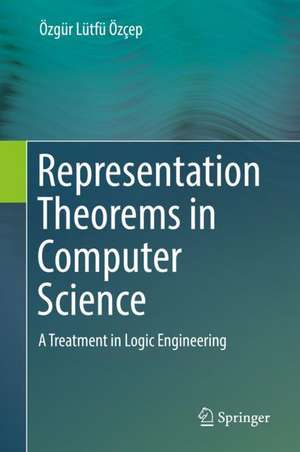Representation Theorems in Computer Science: A Treatment in Logic Engineering
Autor Özgür Lütfü Özçepen Limba Engleză Hardback – 7 aug 2019
Formal specifications are an important tool for the construction, verification and analysis of systems, since without it is hardly possible to explain whether a system worked correctly or showed an expected behavior. This book proposes the use of representation theorems as a means to develop an understanding of all models of a specification in order to exclude possible unintended models, demonstrating the general methodology with representation theorems for applications in qualitative spatial reasoning, data stream processing, and belief revision.
For qualitative spatial reasoning, it develops a model of spatial relatedness that captures the scaling context with hierarchical partitions of a spatial domain, and axiomatically characterizes the resulting relations. It also shows that various important properties of stream processing, such as prefix-determinedness or various factorization properties can be axiomatized, and that the axioms are fulfilled by natural classes of stream functions. The third example is belief revision, which is concerned with the revision of knowledge bases under new, potentially incompatible information. In this context, the book considers a subclass of revision operators, namely the class of reinterpretation operators, and characterizes them axiomatically. A characteristic property of reinterpretation operators is that of dissolving potential inconsistencies by reinterpreting symbols of the knowledge base.
Intended for researchers in theoretical computer science or one of the above application domains, the book presents results that demonstrate the use of representation theorems for the design and evaluation of formal specifications, and provide the basis for future application-development kits that support application designers with automatically built representations.
| Toate formatele și edițiile | Preț | Express |
|---|---|---|
| Paperback (1) | 640.84 lei 6-8 săpt. | |
| Springer International Publishing – 14 aug 2020 | 640.84 lei 6-8 săpt. | |
| Hardback (1) | 647.13 lei 6-8 săpt. | |
| Springer International Publishing – 7 aug 2019 | 647.13 lei 6-8 săpt. |
Preț: 647.13 lei
Preț vechi: 808.91 lei
-20% Nou
Puncte Express: 971
Preț estimativ în valută:
123.87€ • 134.59$ • 104.12£
123.87€ • 134.59$ • 104.12£
Carte tipărită la comandă
Livrare economică 22 aprilie-06 mai
Preluare comenzi: 021 569.72.76
Specificații
ISBN-13: 9783030257842
ISBN-10: 3030257843
Pagini: 190
Ilustrații: XIV, 190 p.
Dimensiuni: 155 x 235 mm
Greutate: 0.46 kg
Ediția:1st ed. 2019
Editura: Springer International Publishing
Colecția Springer
Locul publicării:Cham, Switzerland
ISBN-10: 3030257843
Pagini: 190
Ilustrații: XIV, 190 p.
Dimensiuni: 155 x 235 mm
Greutate: 0.46 kg
Ediția:1st ed. 2019
Editura: Springer International Publishing
Colecția Springer
Locul publicării:Cham, Switzerland
Cuprins
1 Introduction.- 2 Preliminaries.- 3 Representing Spatial Relatedness.- 4 Scalable Spatio-Thematic Query Answering.- 5 Representation Theorems for Stream Processing.- 6 High-Level Declarative Stream Processing.- 7 Representation for Belief Revision.- 8 Conclusion.
Notă biografică
Özgür L. Özçep is a researcher and lecturer (Privatdozent) at the University of Lübeck. His research as well as his teaching covers foundational aspects of computer science with a focus on logical and mathematical modelling for AI related domains and problems. He has published in the areas of belief revision, description logics, ontologies, qualitative spatial reasoning, and stream processing.
Textul de pe ultima copertă
Formal specifications are an important tool for the construction, verification and analysis of systems, since without it is hardly possible to explain whether a system worked correctly or showed an expected behavior. This book proposes the use of representation theorems as a means to develop an understanding of all models of a specification in order to exclude possible unintended models, demonstrating the general methodology with representation theorems for applications in qualitative spatial reasoning, data stream processing, and belief revision.
For qualitative spatial reasoning, it develops a model of spatial relatedness that captures the scaling context with hierarchical partitions of a spatial domain, and axiomatically characterizes the resulting relations. It also shows that various important properties of stream processing, such as prefix-determinedness or various factorization properties can be axiomatized, and that the axioms are fulfilled by natural classes of stream functions. The third example is belief revision, which is concerned with the revision of knowledge bases under new, potentially incompatible information. In this context, the book considers a subclass of revision operators, namely the class of reinterpretation operators, and characterizes them axiomatically. A characteristic property of reinterpretation operators is that of dissolving potential inconsistencies by reinterpreting symbols of the knowledge base.
Intended for researchers in theoretical computer science or one of the above application domains, the book presents results that demonstrate the use of representation theorems for the design and evaluation of formal specifications, and provide the basis for future application-development kits that support application designers with automatically built representations.
Caracteristici
Proposes the use of representation theorems as a means to develop an understanding of all models of a given specification Demonstrates the application of the general methodology with examples in qualitative spatial reasoning, data stream processing, and belief revision Provides the basis for the development of toolkits that support application designers with automatically built representations
